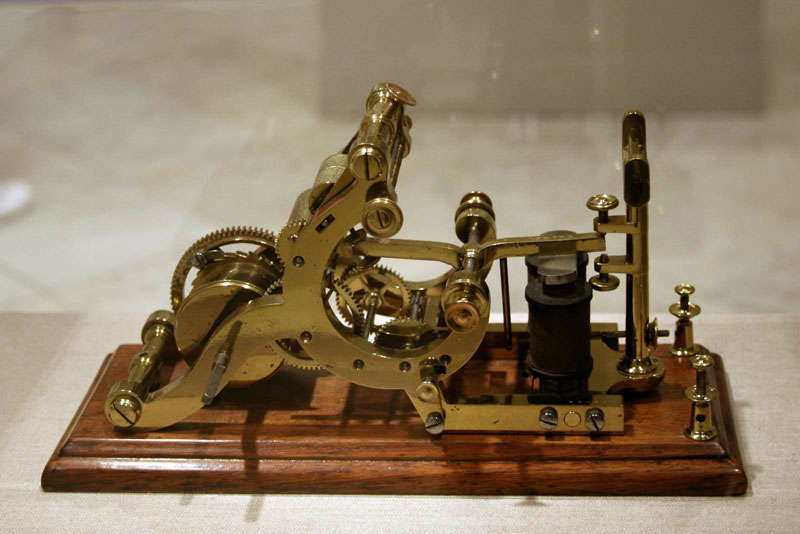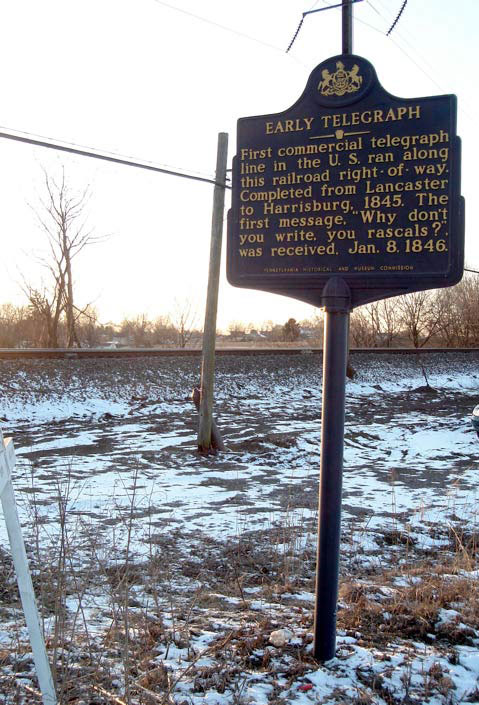The End of Dot and Dash?

It was supposed to be the end of an era. On Sunday, July 14, 2013, according to news sources, a communications worker in India would transmit the last commercial telegram.
Thus would end an epoch that began 169 years ago, on May 24, 1844, when American inventor Samuel Morse sent the first telegram from Washington, D.C., to Baltimore. You may remember that the words of that momentous first telegram were taken from Numbers 23:23, “What hath God wrought.” The first words sent over a commercial telegraph line were not quite so reverent.
That line was strung between Lancaster and Harrisburg, Pennsylvania, by a company under the direction of Morse’s associate, Henry O’Reilly. A few years later, the Post published an account of the telegraph’s early construction:
Magnetic Telegraph
August 5, 1849
Gen. Moorhead, President of Atlantic & Ohio Telegraph Co.We were looked upon as denizens of another world, come to break the quiet, honest industry, and sobriety of Pennsylvania. Then it was mooted abroad that a pigeon had been killed on the wires, that birds had been found dead underneath it, explosions had been heard in the office, and a humming sound had been heard at midnight from the poles as if some divinity held converse with the winds at that lone hour, and the terror increased.
One frightened matron, it was said, fenced a pole carefully, to keep her cow from the contagious touch that would spoil her milk and bewitch her head. Others carefully watched in the distance to see the developments of this last iniquity …
The first foot of wire was erected on a fine, star-lit morning, upon a pole adjoining the outer bridge at Lancaster, the 10th of November 1846 and kept moving on until the evening of Thanksgiving Day. With the snow blowing piteously through the almost naked streets of Harrisburg, four hungry, dirty, unkempt, and unshaven men [stood] near the railroad depot, with an empty reel and wearied hands, hitching the last thread of the mystic line to the post opposite its destined termination.
On New Year’s Day, 1847, O’Reilly was ready to send his historic first telegram. Its message, now captured on a historic marker beside a Pennsylvania highway, read, “Why don’t you write, you rascals?”

It may not be easy for us to comprehend the miraculous impact of the telegraph on the world of the 1840s. It could spread news in minutes that previously would have taken weeks or even months to reach the villages and towns along America’s frontier. As early as 1846, historian Donald S. Frazier writes, “The implications [of the telegraph] for the U.S.-Mexican War were profound. … News from the front arrived in just a few days, and politicians and generals alike could react rapidly to changing circumstances. The public kept abreast of news and supported the war to a greater or lesser degree based on the latest reports …”
Although the telegraph brought fame and wealth to Morse, he had endured years of poverty and frustration before its success, and then had to fight off others who claimed it as their own invention.
In fact, in January of 1839, the Post has seemingly endorsed the cause of one such claimant: “The invention of the Electro Magnetic Telegraph, claimed by Mr. S.F.B. Morse of New York, appears to be entirely due to Dr. Chas. T. Jackson, of Boston, who conceived the idea of such an instrument during his return voyage from Europe, in the packet-ship Sully, in October, 1812.”
Jackson first made his claim in the Boston Post (no relation), alleging that he had “freely communicated” all the details of his telegraph to Morse, who “pretended to feel a great interest in the invention.” Morse denied Jackson’s claim, and ultimately, the U.S. Patent Office denied the doctor any rights to the patent. The decision was just one in a series of setbacks for Jackson, who made several unsuccessful claims to other men’s discoveries throughout his career.
Now, we are told by news sources, the telegraph is passing into history. Yet the telegram will live on. Even after the last message is sent over the wires in India, several companies, which are easily found on the Internet, will still provide telegraphic services; that is, they will deliver your message, on paper, within 24 hours. Farsighted Morse would probably not be surprised to see that even in an age of texting and emailing, people sometimes still need to have their words delivered by hand.